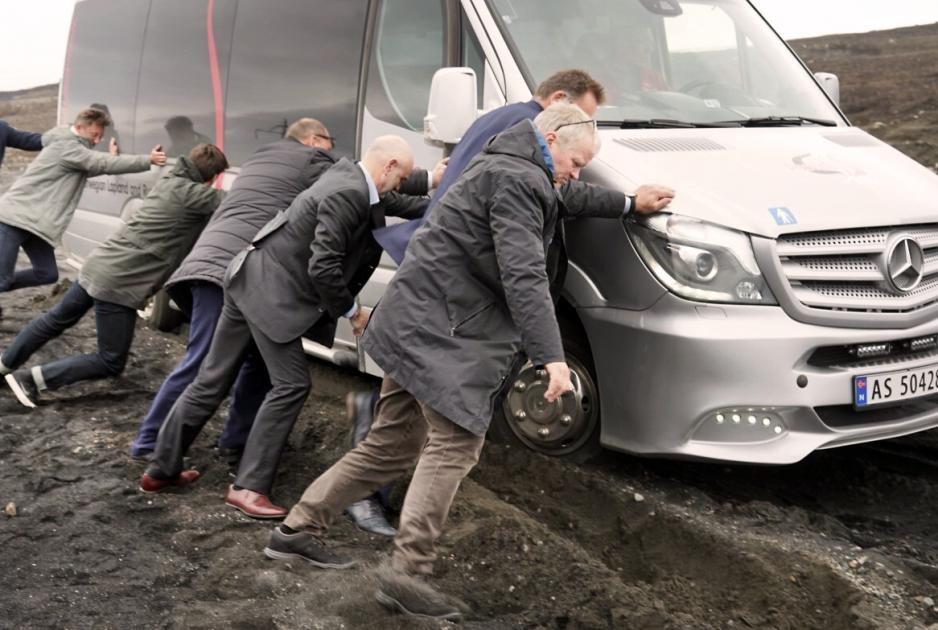Newsletter: Norwegian MP’s Got "Ditched" On Their Way to Examin Russian Pollution

Komiteens medlemer måtte alle ut og hjelpe bussen opp på vegen igjen etter å ha hamna i grøfta utanfor Nikel-verket i Russland. Komiténestleiar Nils T. Bjørke nærast kamera. Foto: Thomas Dam, Stortinget
Dear High North News reader!
A minibus full of Norwegian MP’s running into a ditch was what it took for Norwegian national media outlets to notice the environmental pollution from the Nikel plant in Russia. In a series of articles, High North News has highlighted the pollution which, it should be noted, is considered non-existent by Sergey Ivanov, the Russian President’s Special Advisor on Environmental, Transport and Ecology Issues. Though they are real enough for the Norwegian parliament’s Standing Committee on Scrutiny and Constitutional Affairs to take at trip across the border to look closer at the problem.
But their bus ran into a ditch, and everyone had to step out and help bringing it back on the road. – Bipartisan cooperation helped us back on track, said Nils T. Bjørke of the Center Party to High North News. [Norwegian only.]
It remains to be seen what the Committee will do to limit pollution, pollution that on 25 January this year was so bad that people in the Pasvik Valley, on the Norwegian side of the border, had to stay indoors.
This week broke the news that the Canadian navy will affiliate six new patrol vessels with regions in Inuit Nunangat. The move is interpreted as one in a series of moves made to assert Canadian sovereignty, amongst others in relation to the Northwest Passage. This move was characterized by US Secretary of State Mike Pompeo as “illegitimate” as late as in April before a full audience in Rovaniemi.
Another move, and an important step to mark Canadian territory in the Arctic, was made when the Canadian government last week submitted a 2,100 page-long claim to the UN, defining the outer boundaries for Canada’s continental shelf. The claim constitutes more than 1.2 million square kilometers of seabed and subsoil, including the North Pole.
However, according to researcher Andreas Østhagen at the Fridtjof Nansen Institute, the claims for the North Pole have more to do with national identity and symbol politics than about the hunt for natural resources for the Arctic countries.
Next week will be an exciting one for Denmark and Greenland. On 5 June, there are general elections in Denmark. Four Greenlandic seats out of a total of 179 in Parliament may not appear to be much, though who knows what will happen and who will have the deciding votes?
Inuit Ataqatigiit, Greenland’s largest party in the Folketing has required a position of Minister of the Arctic to be created in order to support any coalition. In an op-ed, Melissa Lesamana asks whether an Arctic Minister may be the way to go to make Denmark embrace Greenland. High North News will of course follow the Danish elections.
Other stories you may enjoy reading include:
Russia’s Rosatomflot Launches Third New Nuclear Icebreaker
Experts Open to Climate Engineering to Prevent Climate Disasters
Arctic Shipping Cooperation Between Iceland and Greenland Faces Legal Challenge
We wish you all the best for the weekend!
Siri Gulliksen Tømmerbakke,
News Editor, High North News
